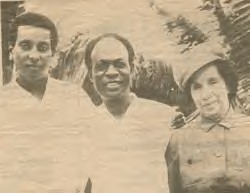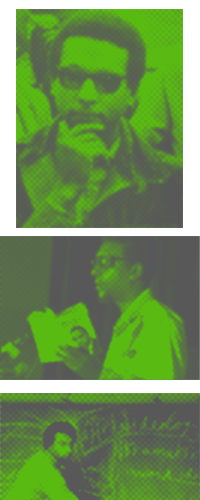 Ture, Nkrumah, and Shirley Graham DuBois
Ture, Nkrumah, and Shirley Graham DuBois
NKRUMAH WAS A TRUE VISIONARY: A GENUINE PAN-AFRICANIST
Kwame Nkrumah was born in 1909 in Nkroful, a middle village in what was then the British-ruled Gold Coast on the West Coast of Africa that we now know as Ghana. And thanks to the education he received from his people, he understood at an early age that he had a responsibility to help his people's movement toward freedom. The generations that came before him had already begun the political struggles for independence against colonialism.
Nkrumah did well in his academic studies and finished all levels of institutions in Ghana. Looking for further studies, he came to the United States. But even before leaving Ghana, he had demonstrated his concern for the liberation of his people. He gave untiringly of himself, his energies to help encourage all movements to uplift Ghana.
In the United States, where, if my memory serves me correctly, he would spend about 10 years, he studied at Lincoln University, Pennsylvania. Nkrumah studied very carefully all aspects of our struggle. He fully engaged in it. He embedded himself in Harlem, where he was a part of all struggles there. And of course, he was at the forefront of all struggles concerning the emancipation of Africa.
Nkrumah never met the Honorable Marcus Garvey, who died in England in 1940. I think it was in 1942 that Nkrumah left America for England, where he was to continue his studies. C.L.R. James, an African born in Trinidad, who was living here in America had thankfully provided Nkrumah a contact. He introduced him to George Padmore, who was then in England. After their meeting, Padmore became Nkrumah's mentor. Probably at that time, Padmore was the leading African with practical and theoretical knowledge of the African struggle throughout the world.
It was with Padmore that Nkrumah would see the need for disciplined study.
As a revolutionary, Nkrumah was always a man given to study. But he would grow to see the necessity of disciplined study within the political field, and Padmore would help to train him in so many ways. And when the fifth Pan-African Congress (PAC) was called together in 1945, Nkrumah, Padmore, and W. E. B. Du Bois served as the coordinating secretaries.
This PAC made clear two very important aspects of the African struggle: One was that they knew the final confrontation with colonialism was coming; therefore, they called for mass confrontation against colonialism. And the second one was their willingness to use arms to arrive at independence. Some people do not look very carefully at history, which moves very fast sometimes.
In 1947, the bourgeoisie of Ghana called Nkrumah to do some political organizing work because they, too, could see that they needed political organization to arrive at independence. Nkrumah accepted, after seeking advice from Padmore. And having established a base in London, he immediately sailed for Ghana, where under the bourgeoisie he was given the job of organizing for political independence.
Of course, the people Nkrumah worked with were speaking not of organizing the masses, since they feared them more than they feared the British. They were speaking merely of using negotiations and tea parties to arrive at independence.
There arose inevitable conflict, political conflict, between the two, and they had to parted ways. Nkrumah immediately set up the Convention People's Party (CPP). The CPP wanted independence now, while others asked for independence as soon as possible. The CPP look to the masses of Africans as the major factor, the major motivating force and the major weapon in the anticolonial struggle. Thus we can see that Nkrumah clearly understood that the African struggle was mass in character and that there must be mass organization. Therefore, the CPP was a mass party.
This is one of the first points at which we want to stop and acknowledge Nkrumah's genius. If we look at all the struggles for independence prior to that time, what we see is that they were carried out at best by "vanguard" parties.
These were the parties that did not touch the masses. Whether these vanguard parties were revolutionary or reactionary, they did not touch the masses. The vanguard revolutionary masses would organize themselves with the most conscious elements of the given society. Then through liaison with the masses, they would come to arouse the masses and direct them to certain action. But having a mass party in which the masses themselves directly participated was unheard of. Therefore, the mass party came to represent a means and method of struggle against colonialism. And Nkrumah gave the mass party a fundamental basis with the CPP
Nkrumah was consistent. If we go to Nkrumah's book, The Handbook of Revolutionary Warfare, in which he outlines the unification process of Africa, we see how he showed Africa coming together.
So this idea of the mass party has continued. But the idea of the mass party itself Nkrumah would tell all, came from the Honorable Marcus Garvey, who injected the mass character into the Pan-African struggle with the Universal Negro Improvement Association, which was a mass organization worldwide. And Nkrumah now used the CPP, a mass party, as an instrument for the independence of Ghana. For Nkrumah, Africa's independence meant everything. Class struggles should be submerged until independence arrived on the scene for the African continent.
Nkrumah never saw Africa as Ghana; he always saw Ghana only as a part of Africa. Those reactionary people who attacked him later saying that he sacrificed Ghana for Africa knew absolutely nothing of the African revolution. Nkrumah never worried about any one part of Africa. He was a true visionary. A genuine Pan-Africanist.Nkrumah not only had created the mass party and showed the rest of Africa the road to liberation through it, but he also came to avenge the history of Africa.The Gold Coast was, of course, changed to the name of Ghana. And more important, he brought back the Black Star Line, a commercial steamship venture, which was given to us by Marcus Garvey. Garvey established the Black Star Line here with the intention of using these ships to go between Africa, the Caribbean, and the United States. J. Edgar Hoover, then head of the FBI, sabotaged Garvey's entire operation of the Black Star Line. Not only did he sabotage it, but also he himself had Garvey arrested on trumped-up mail-fraud charges. Nonsense, just lies as they have done all the way through history.But as soon as Nkrumah won independence and drove the British out of Ghana, one of his first acts was to sign the Black Star Line into being. Nkrumah told them, "You laughed at Garvey, but you will never laugh at us." And he signed in the Black Star Line, which was to travel the world as the the ocean-going fleets of Ghana, which still exist even today despite all the attacks, internal and external, that it has undergone.Nkrumah was a genuine Pan-Africanist. When Guinea got its independence and the French had taken everything-Nkrumah gave [Guinea] from the treasury of Ghana, if my memory serves me correctly, close to $10 million to start the Guinean nation.The burning vision of Nkrumah was a unified Africa. For him, African unity meant everything. This vision of a unified socialist Africa would be an inevitable reality. In all his writings, Nkrumah demonstrated this. And in spite of all the obstacles placed in the path of Africa to keep it divided, the continent will be unified.I have the honor of having worked as a political secretary for Kwame Nkrumah.He invited me to accept this position during my first visit to Guinea in 1967.I jumped at the opportunity understanding that if I did, just by osmosis, I would know more about the African revolution than most scholars.I met Nkrumah through Mrs. W. E. B. Du Bois. I was in China on my way to North Vietnam, where I would have the honor of meeting Ho Chi Minh. I received a dinner invitation from Mrs. Du Bois, who also was in China, which I didn't know.I was overwhelmed. Mrs. DuBois was full of enthusiasm, full of information. Sometime during the middle of our conversation, she asked, "Young man, have you met Kwame Nkrumah?" I said, "No, madam, I've not met him." And she asked, "Would you like to meet him?" I said, "I'd give my right arm to meet Kwame Nkrumah." And she said, "All right, you'll meet him." I thanked her. We continued the discussion. Later, when I was in Algeria, I was given an invitation to come to Guinea. And when I arrived in Guinea, Mrs. Du Bois happen to be there also. She grabbed me quickly from my hotel and said let us go meet Kwame Nkrumah. At this time, he was co-president of the People's Revolutionary Republic of Guinea. And this is how I came to meet Kwame Nkrumah. Previously, Nkrumah served as Ghana's prime minister, 1952-1960, and its first president, 1960-1966. I remember one of the first lessons that he taught me. I was talking about fighting.One of the major purposes for my becoming his political secretary was to organize the fight so that he could return to Ghana. Of course, I was young. I just wanted to fight, fight, fight. So he gave me books to read. Subsequently, I was to do a book report. I guess he instinctively understood that I wouldn't pay much attention. He was correct. I was talking about fighting. After he gave me the books, I read them and brought back the report. He sat me at the desk, and in the British educational tradition, he took out his red pen. He just started with my paper; he marked here, marked there, marked there, while I sat looking at him. When he finished, the whole paper was nothing but red ink. He gave it to me very gently and politely. He looked me straight in the eye. He said, "I thought you came here for the revolution?" I took my paper. I thanked him. I stood up. I asked him could I have the books again, please. And this time, I went and did the report correctly . I promised myself that from day on he would never pick up his red pen against me again. And fortunately, from then on, of all the assignments and missions he gave me, he never again had to use his red pen.Many people have made it appear that Nkrumah was sad and down in the dumps during his last days in Guinea. Nothing is further from the truth. Nkrumah knew that Africa would be unified. And he knew that he would not see it in his lifetime. But he knew that he had to continue to work until his death. So in no way were his last days in Guinea pessimistic or sad. On the contrary, every day news would come to confirm that Africa would be free and unified. You must not forget that Nkrumah died in the early '70s [1972], when the liberation movements were unfolding. He died at a time when Africa was in a period of high enthusiasm. There was full support for the armed liberation movements against imperialism. Nkrumah foresaw the falling of colonialism in Africa. He prophesied neocolonialism as a last stage in Africa. So if Nkrumah were alive today and saw neocolonialism rampant in Africa, he would in no way change his attitude. As we know, Nkrumah understood that neocolonialism is not only a passing phase in Africa, but it is also the last phase in Africa before we arrive at a unified socialist Africa. Nkrumah's most enduring legacy is the work he did for the people. Organize the people. One of his favorite quotes was about how organization decides everything. He taught me to pay great attention to little details. He would tell me over and over again, "Little details will make you lose a war."Nkrumah's plans for African unity were to sweep the African continent. You cannot go anyplace in Africa today without speaking of African unity. And one cannot speak of African unity without speaking of Nkrumah. Nkrumah's plans as laid out in his writings and political works and actions are clear. They represent the only path toward making Africa a unified continent-with a mass body directing its affairs. There's no question that this is inevitable-and will definitely come about. Kwame Nkrumah was overthrown by the CIA. That has been documented in different books. But everyone knows that the CIA played a major role in overthrowing Nkrumah because of his Pan-Africanist ideas, because of his socialist ideas. There is no question that the CIA saw Nkrumah as one of the biggest threats toward maintaining their interest in Africa.
KTS Reading: Ture on Nkrumah
Posted by Josh M at Saturday, June 28, 2008
Subscribe to:
Post Comments (Atom)


0 comments:
Post a Comment